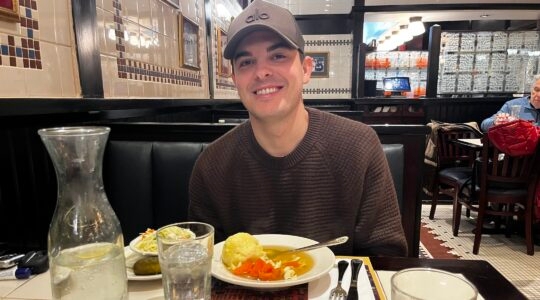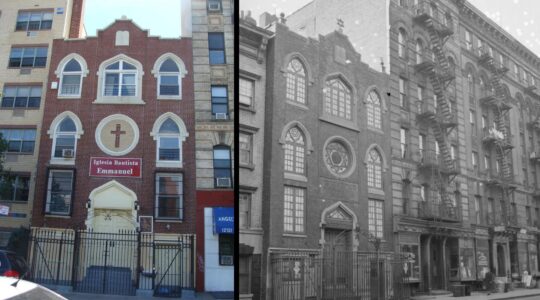Acclaimed Israeli author Amos Oz died on Friday after a short bout with cancer, his daughter said. He was 79.
“My beloved father has just passed away from cancer after a swift deterioration,” his daughter Fania Oz-Salzberger said in a brief statement. Oz died “peacefully in his sleep, surrounded by loved ones,” she said, calling on the public to respect the family’s privacy.
“Thank you to all who loved him,” she said.
Oz was one of Israel’s most widely read and best-known writers, and was hailed by Israel’s president on Friday as the country’s “greatest writer.”
He won dozens of awards, including the Israel Prize and Germany’s Goethe Award, and his books have been translated into 45 languages. He had repeatedly been mentioned as a leading candidate for the Nobel Prize for Literature, but it eluded him.
Born Amos Klausner in Jerusalem in Mandatory Palestine in 1939, the city would provide a canvas for many of his works including “Black Box,” and “In the Land of Israel.”
He is survived by his wife Nili and three children.
Considered one of the most accomplished authors in the history of Israeli literature, Oz was also among the country’s most vocal left-wing activists and supporters of a two-state solution.
“My Zionist starting point has always been simple: We are not alone in Israel and in Jerusalem, and neither are the Palestinians. We cannot become one happy family,” the author said in a 2015 interview.
“There is another way: They are not going anywhere, they have nowhere to go; we have nowhere to go. The house should be divided into two families,” said Oz, a co-founder of the Peace Now group.
After news of his death was announced on Friday afternoon, tributes poured in from across the political spectrum in Israel.
“A tale of love and light, and now great darkness,” said President Reuven Rivlin, referring to Oz’s autobiographical work “A Tale of Love and Darkness,” which was turned into a film by Natalie Portman.
“Sadness has descended on us,” Rivlin said, calling Oz “our greatest writer,” and “a giant of the spirit.”
“Amos Oz will be remembered as a giant! His writing has influenced generations of Israelis, Jews and followers all over the world,” said Isaac Herzog, the chairman of the Jewish Agency and former head of the Labor party. “His original and rich language, his moral strength and fight for justice and peace will be his eternal legacy. Heartfelt condolences to his family!”
Culture Minister Miri Regev, who was often at odds with Oz politically, said his works “resounded around the world and inspired all our hearts.”
Ayman Odeh, head of the Joint (Arab) List party, hailed him as a man of equality. “I met Amos Oz a number of times and even when we argued (quite a lot!) he was a partner who stood for equality, ending the occupation and peace,” he said. “He was not afraid to speak his mind and was an exceptional talent.”
Oz was the only child of parents who emigrated from Russia and Poland to help establish a homeland for the Jews.
His austere childhood in the final years of British-mandate Palestine — haunted by the Holocaust and the threat of war for the land claimed by two peoples — would serve as a major theme of his literary works.
So would the suicide of his mother when he was 12, the topic of his heart-wrenching memoir “A Tale of Love and Darkness.” Seeking a break from his life in Jerusalem, he moved to a kibbutz collective farm at the age of 15 and changed his last name to Oz, Hebrew for strength and bravery.
It was while living on the kibbutz, where he would remain on and off for the next 25 years, that Oz emerged as a writer, focusing on daily life and family tribulations.
“My work is the comedy of unhappy families, not tragedy,” he has said.
His early works, many of which were published in Hebrew by the Israeli Labor Party’s publishing house, included “Where the Jackals Howl” (1965) and “My Michael” (1968).
Other works of fiction include “Black Box” in 1987, while “A Tale of Love and Darkness”, the autobiographical story that portrayed three generations of Jewish life in Jerusalem, was published in 2002.
Oz’s final novel “Judas” was nominated for the Man Booker Prize. Aside from a detective story about Jesus and Judas, it was full of the other familiar elements of an Oz novel, including enigmatic characters, the complicated environs of Jerusalem, and endless questions about the State of Israel.
Speaking to the Times of Israel after it was published in 2016, Oz said there was something of his own self in each of the three “Judas” characters, but that was not unusual, he said, given that everything he writes is in some way autobiographical, originating from things he’s heard or seen, dreamed, read or fantasized about.
What would be familiar to readers of Oz’s previous works was the setting, Jerusalem of 1959, the years that were “the morning after,” said Oz, “after the cataclysm, after the euphoria, after the huge monumental changes unprecedented in Jewish history. The lines for chickens and eggs, the shortage of electricity, the bureaucracy, the long list for telephone lines.”
Jerusalem of Oz’s youth was a divided city, he added, with “barbed wire, minefields, walls, snipers. It was a very small city, yet with a kind of loose federation of different communities that on the whole coexisted very peacefully.”
“It was a divided city linked to the rest of Israel by a fairly narrow corridor, threatened almost daily,” said Oz. “Even before the State of Israel, it was a very tense and insecure place with uncertainty about the future when I was a little kid.”
Nobody talked to the young Oz about those uncertainties, but it was in the air, he recalled.
The New York Jewish Week brings you the stories behind the headlines, keeping you connected to Jewish life in New York. Help sustain the reporting you trust by donating today.




